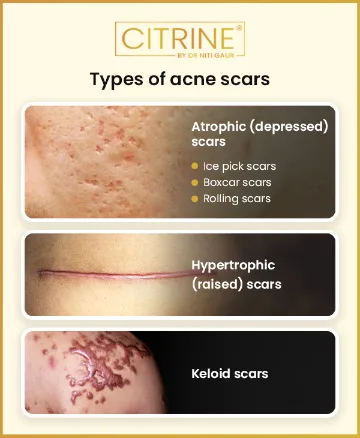Every type of acne scar cannot be removed with a particular acne treatment.This means every treatment option offers varying degrees of success depending upon the type and extent of acne scarring.Here are some of the best acne scar treatment in Gurgaon options performed by a dermatologist in Gurgaon at Citrine Clinic:
1. Subcision in Gurgaon
Subcision, also referred to as subcutaneous incision - less surgery, is a minor surgical procedure to treat atrophic acne scars.The treatment involves the use of a tri - beveled hypodermic needle that is administered into the acne scar through a puncture in the surface of the skin, and its sharp edges to skilfully or carefully move under the defect to make subcuticular cuts.It is done to break apart the fibrotic strands that tether the acne scars to the underlying subcutaneous tissue.The depressed acne scars are lifted by this treatment and from the connective tissue that forms during the normal wound healing response.Get the benefits of acne scar removal with subcision in Gurgaon, make a visit at Citrine Clinic.
2. Chemical peel in Gurgaon
Chemical peeling involves the use of acids/special chemicals to exfoliate the skin- i.e. remove the top affected, old skin layer and allow the healthy, clear, smooth skin from underneath to present, that has fewer scars. There are three types of chemical peels: mild/superficial, medium, and deep peels which vary in the strength of the acid used and the degree of penetration. The most commonly used chemical peels to treat acne scars include glycolic acid, salicylic acid, resorcinol, Jessner’s solution, and trichloroacetic acid.
The acne scar treatment doctor in Gurgaon Dr. Niti Gaur recommends the best type of chemical peel which is suitable for the patient’s skin type, the severity of acne, and acne scar type. Depending upon the type of chemical peel chosen, the treatment may be repeated several times for achieving and maintaining optimal results.
3. Dermal Filler in Gurgaon
Soft tissue fillers like hyaluronic acid, autologous fat, or other collagen - stimulating fillers like polymethylmethacrylate, poly - L - Lactic acid, silicon, and polyacrylamide can be administered into the skin to safely and effectively plump a few depressed / atrophic acne scars, but not ice pick scars.Most fillers provide us temporary results lasting for 6 to 18 months while some are semi - permanent and permanent too.Depending upon the type of filler used, the patient may need to repeat taking the treatment after some months.Silicon and polyacrylamide may never need replacement.
4. Laser skin resurfacing in Gurgaon
In this treatment, ablative or non-ablative lasers are used to resurface the skin by delivering thermal energy to the scarred collagen underneath the skin with or without harming the superficial skin. The treatment relies on the body’s wound healing response to boost healthy collagen production and encourages the growth of new, healthy skin to replace acne scars.
It is preferred for reducing the appearance and texture of raised acne scars.Some common lasers that can be used to treat acne scars include carbon dioxide lasers, erbium YAG lasers, and pulsed - dye lasers.Dermatologists can help determine the type of laser which is best suited for the patient & rsquo; s skin type and the kind of acne scars.
All these treatments have helped many people to achieve a healthy and radiant looking skin. For more information about acne scar treatment cost in Gurgaon, India pay a visit now at Citrine Clinic, best skin clinic in Gurgaon.


